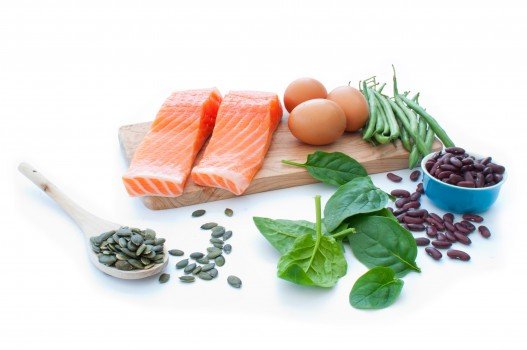Amino Acids are the building blocks of protein. They help to transport nutrients in our bodies, give our cells their structure, and are essential for building and repairing muscle tissue. Sounds pretty important right? Well, they are! You might be wondering, what are the best food sources and do I have to eat high-protein meat to get the greatest benefit? For all you omnivores out there, eating animal protein is surely a fabulous option and this section will help you identify which choices are best. However, never fear vegetarians! There are plenty of plant proteins like beans, seeds and nuts that serve as amino acid all-stars as well.
While amino acids are prevalent in many foods, it’s important to note that the amino acids contained in one protein might not be found in another, so diversifying your sources will ensure that you get all 20 of them in your diet. This is especially important for vegetarians and vegans because many vegetables contain very low amounts of essential amino acids. Most animal sources (meat, fish, poultry and eggs) are what’s called “complete proteins” and contain them all.
Amino Acid Supplementation and Protein Powders
Since amino acids are prevalent in many food sources, additional supplementation is usually only needed only for strict vegetarians, malnourished individuals, or those with increased protein requirements. It is under these conditions that an amino acid may be classified as conditionally essential because some aminos cannot be produced by our bodies without assistance. Supplementation however, should always be given careful consideration, as most protein supplements are synthetic and not nearly as beneficial as protein consumed from natural whole food sources. Nature provides amino acids in combination; humans isolate them for processing purposes.
The question then arises, do I need to supplement? Amino acid supplements and protein powders are often synthetic, man-made, and an incomplete version of the original protein. For this reason, Good Decisions does not recommend them. If you must use a protein powder or if you’re considering an amino acid supplement, think about brewer’s yeast instead. Brewer’s yeast provides all the essential amino acids, an impressive amount of B vitamins, minerals, and trace elements. Brewer’s yeast can easily be incorporated into any diet and is especially valuable for vegans and vegetarians because of its impressive protein content. Two tablespoons of brewer’s yeast contain a whopping 16 grams of protein, far better than any protein powder I have ever seen! You can sprinkle it on salads, mix it into a smoothie, stir it into soups and gravies, or use it as a thickener for sauces.
Insider Tip – Lycine Supplement vs. Brewer’s Yeast
Did you know that Lycine supplementation is regularly prescribed for people with herpes to control or prevent outbreaks? [I] Supplemental Lycine is often taken in the amounts of 500 to 1000 mg. It’s frequently synthetic and in isolated form. On the other hand, two tablespoons of brewer’s yeast contains 882 mg of Lysine, along with a number of other amino acids, B vitamins, minerals, and chromium, an essential mineral that plays a key role in how insulin helps the body regulate blood sugar levels. Yet another example of how food can pack a powerful punch!
Read through each of the buttons above to learn about the three types of amino acids and be sure to take note of the specific foods to include in your diet.
Take action!
Make a simple change today by incorporating a little bit of protein with each meal and as snacks in between. It doesn’t have to be a huge steak. It can be as little as having oatmeal for breakfast, a salad with chicken for lunch, and vegetables and fish for dinner with nuts and seeds as snacks in between. This is a great way to not only get your essential amino acids, but also to begin to balance your blood sugar levels and get off of the blood sugar roller coaster ride. You will reap the rewards of increased energy, weight loss, emotional balance, and mental clarity. It’s amazing how easy it can really be!
(If you need additional support and guidance to end your sugar addiction once and for all, take a look at our No Sugar Challenge!)
Resources
[I] Griffith RS, Walsh DE, Myrmel KH, Thompson RW, Behforooz A. “Success of L-lysine therapy in frequently recurrent herpes simplex infection. Treatment and prophylaxis.” Dermatologica. 1987;175(4):183-90. Web. May. 2016. <http://www.ncbi.nlm.nih.gov/pubmed/3115841>.





